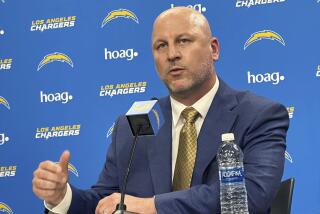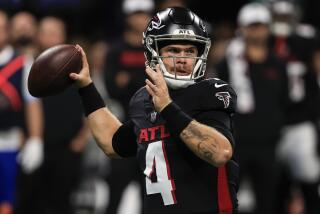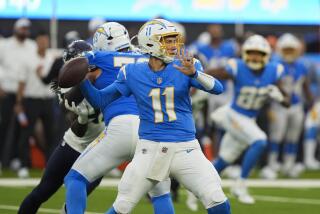No Need to Explain or Defend Chargers’ First Round Picks
In the span of 39 minutes in Tuesday’s early hours, the Chargers did the equivalent of hiring a pirate and a palace guardsman.
This was the day for the National Football League’s draft of college talent, and the Chargers tapped that pool for one guy to guard the front gate and another guy to crash through any door or window to get to his prey.
What the Chargers wanted was a defensive lineman to pursue enemy quarterbacks and an offensive lineman to keep Dan Fouts on his feet and out of the whirlpool.
“Two guys control the game,” said Ron Lynn, the Chargers’ defensive coordinator, “the guy throwing the football and the guy rushing him.”
It’s that simple.
Lynn was uttering these philosophic but basic words at about 7:30 a.m., shortly after the Charger brain trust had visited the press room to explain the whys and wherefores of the two first-round choices.
However, these were choices that hardly had to be explained.
Defensive end Leslie O’Neal is the pursuer and offensive tackle James FitzPatrick is the protector. The Chargers needed exactly what those two will provide.
This was not a day when the front office had to defend its choices with rhetoric about taking the best available athletes. This was a day when the front office could smirk like a little kid who got the cookies out the jar without his mother’s noticing.
Indeed, Alex Spanos and his henchmen had to do some rather rapid long-distance maneuvering to get what they wanted. Defensive linemen apparently were at the top of their list of wants, and it did not surprise them that Alabama’s Jon Hand disappeared from the board as the fourth pick of the first round. And it would not have surprised them if O’Neal had been gone by the time they were called upon to make a selection.
With that thought in mind, the idea of getting the best for their defense, they did what the Chargers do best.
They went on the offensive.
It was time to pick up the telephone and try to consummate a transaction that would allow them to draft earlier than 13th in the first round. They had been attempting to make such a move for quite some time, and they were getting increasingly antsy.
And, finally, the Minnesota Vikings called.
“We’ve waited two months trying to make a trade,” Spanos said, “and it took us less than three minutes to actually make it.”
It was made with little time to spare. Each team had 15 minutes to make its first-round choice, and Minnesota had only five seconds on the clock when the deal was made and announced.
These draft-day deals appear to be a rather impersonal shuffling of numbers, in this case the Chargers getting the eighth and 67th players in the draft and giving up the 14th and 44th.
However, the swift execution of such a deal speaks well of the efficiency and organization of Spanos’ management team. There is little doubt that O’Neal would have been gone by the time the Chargers would normally have stepped to the microphone.
And this man O’Neal someday could be the type of player the Chargers lost when Fred Dean departed. He is not big, only 245 pounds, but Dean wasn’t big either.
In fact, defensive ends must be quick because they have to get around offensive tackles who stand 6-feet 8-inches and weigh 290 pounds.
Guys like FitzPatrick.
The drafting of FitzPatrick came at the end of an intriguing period of speculation for Charger followers. After O’Neal had been picked at 6:28, the draft ground its way through the ninth, 10th and 11th picks and finally Detroit was in line to make the 12th pick.
The Chargers were now one pick away from their second first-round selection, and Iowa quarterback Chuck Long was still on the board.
What if Detroit did not take him? What if a quarterback of Long’s caliber were still available?
The question was interesting, but moot. Detroit took Long, and the Chargers took FitzPatrick at 7:07.
And so the Chargers, in back-to-back first rounds, had put together San Diego’s version of twin towers at offensive tackle. FitzPatrick will join Jim Lachey, last year’s No. 1 pick, a 280-pounder who stands 6-6. Getting around those guys will be a cab ride.
Spanos, the construction magnate, had built a fortune from the ground up--and now he was building his football team from the front back.
After all, football games are won and lost by pass rushers such as Leslie O’Neal and quarterbacks such as Dan Fouts, who need pass-blockers such as James FitzPatrick.


